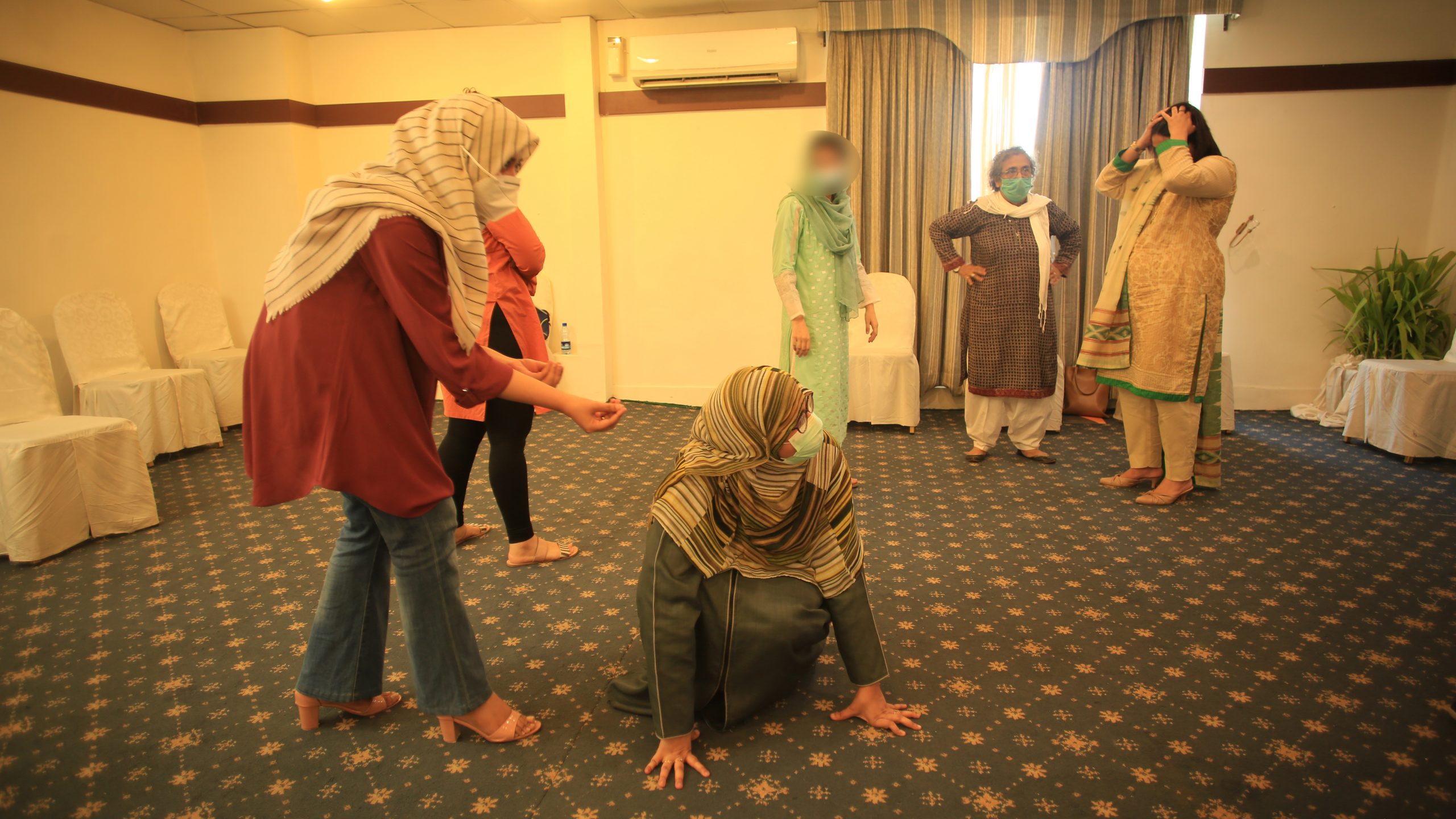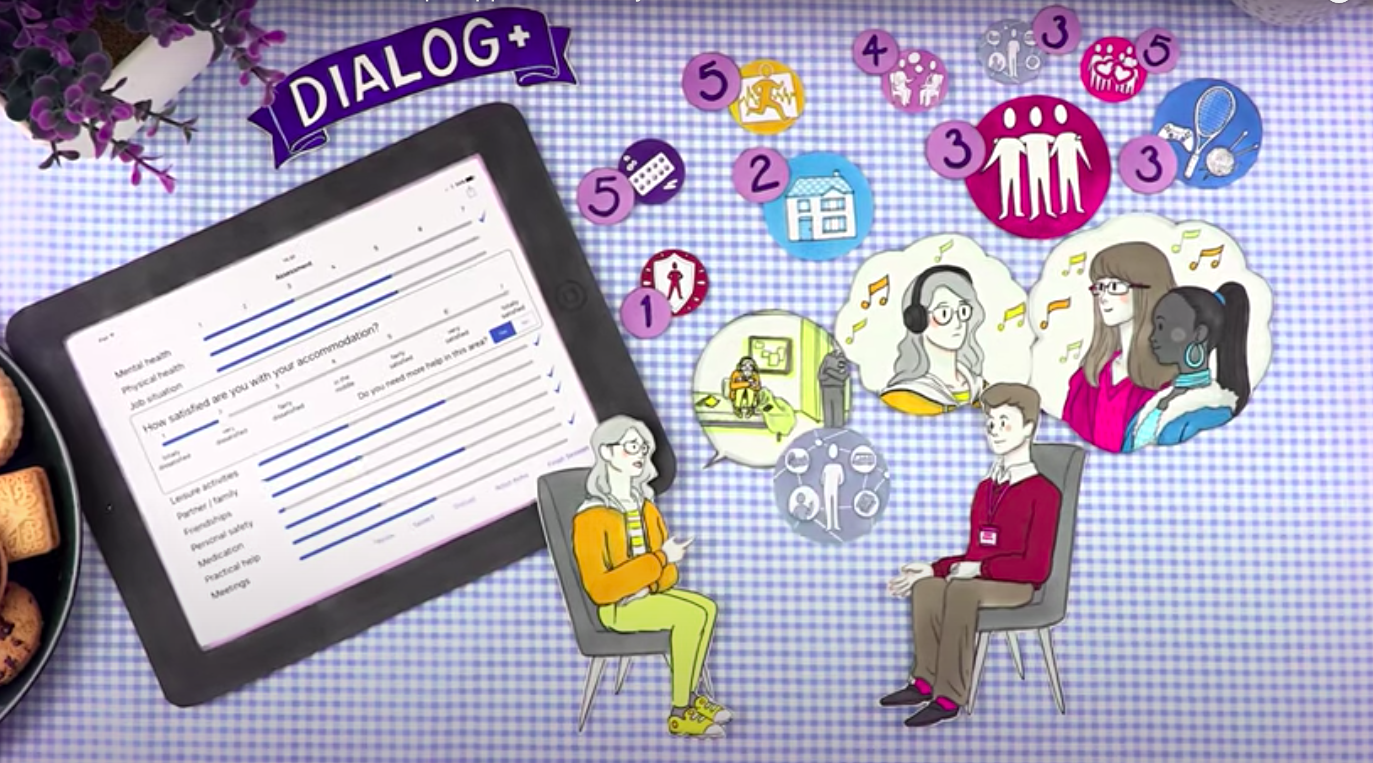First Impressions as an Observer: Arts Workshops as part of PIECEs Research
*written by Hufsa Sarwar – PIECEs Research Coordinator in Pakistan
Pakistan has a rich history of arts and drama, however, even in 2021 theatre as an art form has not been able to integrate into the mainstream entertainment circles. It has unfortunately either been associated with taboo ideas and behaviours, or is available to a few privileged groups in society. Knowing this, I felt extremely apprehensive about organising Theatre of the Oppressed workshops – a new concept within mental health – for healthcare providers, caregivers, and people with lived experience of psychosis. Even if they agreed to be a part of the sessions, would they be able to leave behind their inhibitions and play with us while sharing their personal stories?

Healthcare workers during Theatre of the Oppressed Arts Workshops
Convincing our desired demographic to attend the workshops proved to be a long and gruelling process. People were unable to comprehend how games and exercises would help with furthering the understanding of the experience of psychosis in Pakistan. Thankfully, we were able to enrol a sufficient number of participants from each of the three groups, and kicked off the first set of workshops with psychiatrists and psychologists. Contrary to my expectations, the seemingly serious healthcare providers broke away from the confines of their professions, and took part in the games without reservations, sharing poignant stories and experiences from their clinical work. Led by our Arts partners from IRC (Interactive Resource Centre), some of the images created showed their struggle with burnout, lack of availability of support staff at hospitals, the importance of family counselling, and the great need for support groups for caregivers of people with psychosis. We received positive feedback from all the healthcare providers, who shared that they were usually so entrenched within their daily routines and structures that they were unable to view the experiences of patients and caregivers from the different perspective that Theatre of the Oppressed provided.

We decided to hold workshops with caregivers and people with psychosis together in the same room due to challenges around attendance. These individuals surprised me with how generous they were with their stories and challenges, and how brilliantly they communicated through the games and exercises. Initially, the caregivers exhibited some resistance; however, once they saw their family members and others with psychosis enthusiastically taking part in the activities, they decided to loosen up as well. Most participants with psychosis shared that they expected to feel better after these workshops, and that they wanted to learn something new. Most caregivers said they were there because of their family member, and wanted to learn how to better support them. By the end of the second day, the entire group came together and constructed powerfully evocative images of being restrained by their family members when experiencing active symptoms of psychosis, the challenge of seeking care at overburdened hospitals, the overwhelming responsibility and subsequent stress faced by caregivers, and the need for increased empathy and understanding of the condition.

The stories and experiences that our participants shared have opened up a myriad of questions around the challenges faced by those living with psychosis, their family members, as well as the healthcare providers who work with them. We hope to work with these stakeholders to further develop these stories, and bring them to the wider community to raise awareness and increase acceptance and understanding of psychosis in Pakistan.
To finalise, read the impressions from Dr. Faiza Rehman, Psychiatrist at Jinnah Postgraduate Medical Centre (JPMC), regarding her participation on the Arts Workshops:
I registered for the workshop with a lot of curiosity, to be honest. It was almost serendipitous for me that art forms were being utilised in the management of mental health. Although this isn’t a new concept, it is now not only being implemented in Pakistan but is also within reach. It was a thoroughly refreshing experience and I will take the liberty to say that I was there partly to cater my own cravings for performing arts and being able to be of some help for others, in that process, was a double fold joy in itself. Although the moderating team and my fellow participants met each other for the first time, the bond that was formed between them and the experience gained was such a positive one – probably due to the goodness of intent and nobility of the cause that brought them together. The workshop helped us see the small details of patient care and even the perspectives of a caregiver that might get neglected in the routine hassle of managing the patient. With a lot of heartfelt wishes for the team managing this project I look forward to more such activities and would be eager to be a part of them in the future.
First Impressions: Using DIALOG+ in PIECEs pilot phase
*written by Dr. Padmavati Ramachandran, Co-Investigator on PIECEs and Director at Schizophrenia Research Foundation (SCARF)
Psychosocial interventions, that impact recovery for persons with psychosis, are contingent upon several aspects – the person with psychosis, family, the care provider, available resources and in all likelihood, the passage of time! Hence, development of a new comprehensive intervention in the field of psychosocial interventions is in itself a challenge and testing the intervention even more so.
The DIALOG + an intervention designed to promote better patient-clinician interaction, brings in a structure to the conversations in routine clinical interactions. Being a part of the team piloting the tool at SCARF, it became very clear, right at the outset that tool was actually facilitating a dialogue with the patient that would not just improve conversation , but also facilitate a solution focussed discussion.
The first participant, a 43 year old women, was someone I have occasionally met in clinical encounters. She would always complain that she had a lot to speak about – but the doctors were so busy in the OPD, that she didn’t think it was right for her to take more time. The first session with the app – actually left her feeling that she was listened to – in her own words “l feel that for the first time – I have said all that has been bothering me in terms of my functioning” And, she adds, “you have spoken to me and not my husband… that makes me feel even better”
One interesting observation with the third participant was something that I least anticipated. In the domain related to Job situation – the participant a home maker, spontaneously stated that her action plan would be to learn to create an email id for herself – so that she can apply for jobs. This was something that was never picked up during clinical interactions! Similarly, a male participant who works as a tailor, who wanted to feel more energetic – reported that he could exercise and we then engaged in a discussion of what he could do to exercise. He left the session , saying that he liked the idea of exercising – an activity that he had not thought of before!
The experience of handling a gadget – the tablet in this case – is a very new experience, even for me as a clinician! While I do use the electronic medical records system for client data storage, using the tablet as a medium to communicate to the client is quite a task, especially when the participant is not very familiar with using the electronic medium. But as I realised over the next few sessions , it was a matter of practice.
The app driven technology is very user friendly and simple. This enables the participant to be able to read and relate easily to the visual analogue scale. The use of the Tamil language has made the interaction even more suitable! There are of course, sections that will need adaptation to the Indian lifestyle and the PIECES project aims to do just that!
Overall, I feel pretty excited at using this tool – it has brought in a structure to a patient centric engagement, meaningful enough to hopefully improve on functioning.
Alongside with Dr. Padmavati’s first impressions in India, in Pakistan Dr. Aneela Mushtaq , clinical psychologist at hospital Karwan-e-Hayaat, gives her account of the experience with the intervention so far:
Since I have started using DIALOG+, I have found this exceptional intervention, convenient for both therapist and patient; reliable, time-saving and specific in targeting the main issue which is causing distress. It helps both therapist and patient to understand problems in more depth. Before, both sides had to do a lot of paperwork during psychotherapy sessions, however ever since I have started utilising DIALOG+ in my therapy sessions, my paperwork has noticeably decreased. If I talk about my patients’ views regarding DIALOG+ – according to them it is very easy to work with the instrument, and they can easily highlight the core issue which is the main source of problems. Previously both the therapist and the patient needed to take part in four to five sessions to come to the conclusion of the main problem, as normally either we are doing it verbally or performing some paperwork for clear understanding. Furthermore, another very effective part of the intervention is the action plan. This option helps to form smart goals for the rest of the week: patients have to achieve those goals while working on it.
To understand more about DIALOG+ and how it’s used, please access the official website
Reflexive Analysis: Clinical sciences & the other sides, coming together for a common goal
*written by Kausar Khan, Co-I in PIECEs, social scientist and expert in community engagement
The clinician, armed with scientific know how, is well equipped to deal with the medical side of psychosis, but the challenges rises from the socio-cultural context of the patient with psychosis. The patient is not alone, his/her family is vested in the well being of the patient. The optimal use of clinical sciences becomes possible with the help of reflexivity, ecological framework, meaning of participation, SALT, Theatre of the Oppressed
Reflexivity is an honest act, & you are its sole witness. The reflexive practitioners examines their own attitudes and assumptions that shape their teaching/learning methods, and thus continually improve their experiences and learn from them. To become reflexive, you must begin to practice reflexivity
The ecological framework draws attention to the relationships between individuals and their families, and the individual/families with their communities/neighbourhood. A patient with psychosis, like any individual, is caught in a web of relationship s. Medical treatment of an individual has to be nested in the understanding of the family, neighbourhood and social norms that control individuals and families.
Participation. What is the nature of participation of a patient and his/her family in the wellbeing of the patient? Participation is a central concept in primary health care, as well as in all community development efforts. Typology of Participation helps understand this notion, and also reflect on the type pursued in one’s work. SALT is committed to the type of participation/engagement that would be based on community’s ownership of the issue; and taking action to take forward their aspirations/dream. Theatre of the Oppressed, ideologically resonating SALT’s aspirations of ownership, uses powerful theatre-techniques developed by the founders of this approach.

For further resources on the subject, this article might also be useful.


